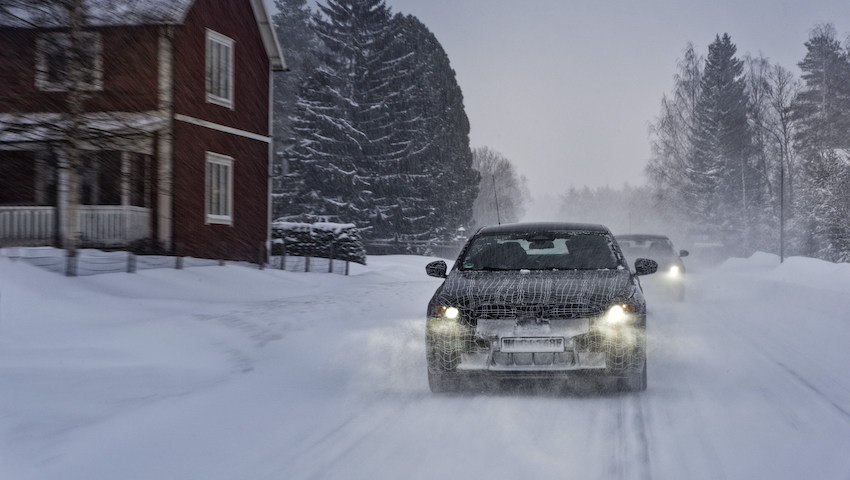BMW i5 completes winter testing programme ahead of global debut
The fully-electric BMW i5 has completed its winter testing programme, showcasing its capabilities to perform on ice and snow.
As part of the production development process, a prototype model of the all-electric BMW 5 Series fully camouflaged with a special wrap, plastic attachments, grilles and provisional headlights and rear lights set off on a five-day test drive from the foothills of the Bavarian Alps up to Denmark, then on to the edge of the Arctic Circle in Swedish Lapland.
The journey of around 3,000 kilometres (1,850 miles) provided an early opportunity for the motors, power electronics, high-voltage battery and integrated heating and cooling system for the cabin and battery pack to demonstrate their advanced level of readiness on a long-distance journey.
Featuring cutting-edge battery cell technology and intelligently controlled thermal management, the fifth-generation BMW eDrive technology – further upgraded for the new BMW i5 – forms the basis for long ranges and short charging times during breaks in the journey, even in extreme sub-zero ambient temperatures.
This was followed by more testing over the course of 2022, both at other BMW Group test facilities and in everyday driving in and around Munich as well as in the vicinity of BMW Group Plant Dingolfing. The task here was to continue refining the car’s chassis technology and acoustic properties under a wide variety of conditions, as well as honing the drive unit’s power delivery, in order to produce a well-resolved driving experience at all times.
Here again, part of the development work was deliberately carried out during the colder months on icy and snowy roads in the Alpine foothills. This last winter, BMW i5 prototypes – now sporting less camouflage and near-production headlights – were regularly sent out for testing to verify the functionality and reliability of their powertrain and chassis control systems in extremely demanding road and weather conditions. The BMW engineers involved in the vehicle project were able to directly inspect the current state of development through testing in the BMW brand’s native Bavaria before it was time to return to endurance testing near the Arctic Circle in February 2023.
The purpose of this second round of testing in Sweden was to fine-tune all powertrain and chassis control systems. Thanks to their low-grip surfaces, the test areas sited on frozen lakes around Arjeplog were particularly well suited for delicately adjusting the drive torque control system in the BMW i5 under precisely reproducible conditions. In the new BMW i5, the DSC (Dynamic Stability Control) system, the near-actuator wheel slip limitation function and the drive torque control system are interlinked so that they can interact and complement each other flexibly in any driving situation. As a result, the all-electric sedan performs at least as proficiently as any conventionally powered model on ice and snow.
